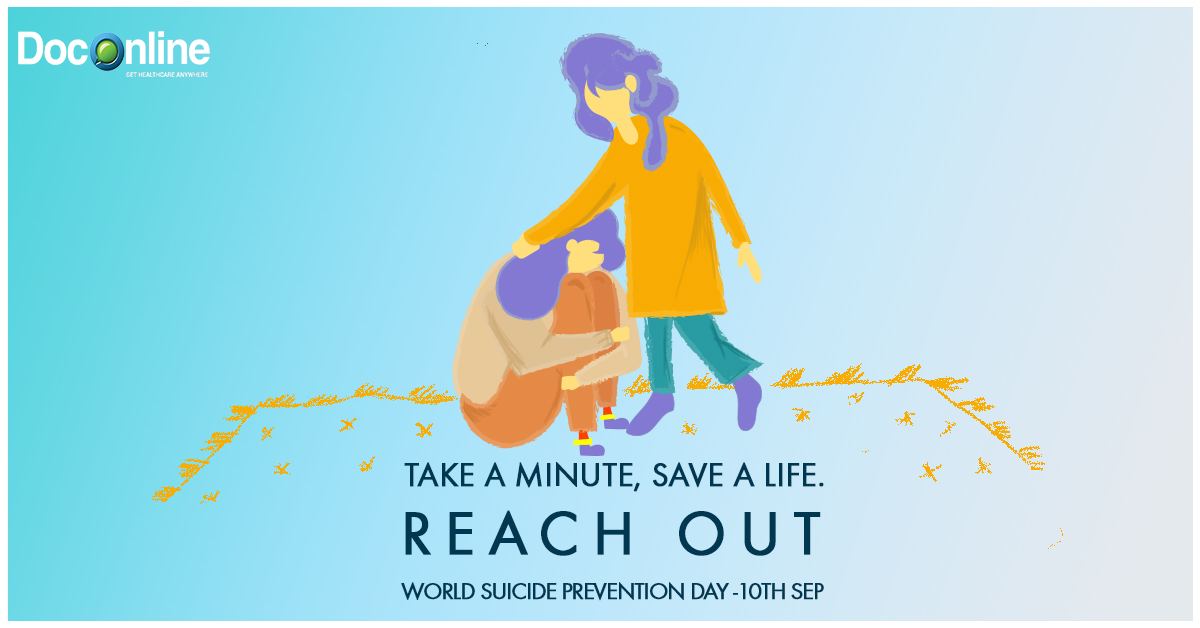Suicide, the act of intentionally ending one’s own life, is a tragic event that leaves painful scars for the victim’s survivors and family. According to WHO Report, there is one suicide in every 40 seconds, accounting for over 800,000 suicide deaths in a year.
10th September is observed as World Suicide Prevention Day. Let us understand what suicide is all about and how it can be effectively prevented.
Suicide is the result of a convergence of many factors. These factors include genetic, cultural, psychological, social and other risk factors. These are also sometimes combined with traumatic experiences and a sense of irreplaceable loss. People who take their own lives belong to a heterogeneous group that exhibit individualistic, complex and multifaceted underlying influences that lead to their final act. Understanding these complexities is a challenge for experts who work tirelessly to prevent such suicidal occurrences. These challenges can be overcome by adopting an organized approach to understand the precursors that trigger such occurrences and hence prevent them.
Understanding why a person commits suicide
Severe depression, feelings of hopelessness often push distraught people on a path where they lose touch with reality. For instance, a normal person would definitely not walk towards a potentially dangerous object like an approaching train, knowingly. That is because the normal person is well aware of the consequences and thus steps aside on the path of life.
However, in sharp contrast, a troubled person with suicidal tendencies would walk towards an approaching train. Why? This is because such a mentally derailed person has this intense, deep-rooted feeling where everything around presents closed doors and the only open door of hope ‘apparently’ seems to be the path on which the speeding train is approaching.
Understanding the psyche of such people is a complex affair as it is difficult to reach out to them and make them see sense. Not impossible but difficult, nevertheless. It requires time, patience, attention and a great deal of compassion.
How to help a person with suicidal tendencies?
The common question that often comes up is, “how do I help a loved one or friend who is having suicidal tendencies?"
The first step to is to ‘understand’. Yes, to feel and comprehend the gravity of the situation - how deeply the person is affected. Clinical counselling, medication and therapy can encourage the patient to speak up. It’s very important for the patient to vent out bottled feelings. This is because, if its otherwise, the negative feelings descend into depression and can engulf the patient into throes of various mental diseases like schizophrenia, bipolar disorder and suchlike, wherein the situations become more difficult.
It is important to remember that mental illness is not a personal failure. The absence of one's insight is the real issue. The etiology is laid by self depression, anxiety and lack of mental health education, awareness and most importantly society bullying. That is why it is important to dawn awareness in the society and lay off the social stigma.
Another important aspect is never to ask depressed people why they are depressed. Depression isn’t a straight forward response to a bad situation. It just comes and goes off like seasonal changes. One should empathize with them and try to understand the hopelessness and loneliness they are going through. One should be by their side and stay strong throughout.
These days telemedicines offer online doctor consultation platforms to people to share their problems with doctors in complete privacy. This can help to gain the confidence of people with suicidal tendencies in their initial stages and prevent them subsequently.
The scariest aspect is when such victims suffer from asking for help. When a suicidal person receives a patient compassionate listener (who could be a counsellor, friend, family, loved one or a well-wisher), he/she can open-up much more easily. This act of opening-up, ‘letting go’ is an incredibly brave thing to do. No problem, however small or big is short of help. This is when such patients need to be reminded and made to feel that they really matter, that they really are important. By gradually bringing them to reality through, listening, counselling, medication and therapy (depending on the requirement), they will realize - they should never, they can never, and they will never give up on life.
Thus, in the words of Shannon L., “Never give up on someone with a mental illness. When 'I' is replaced by "WE", Illness becomes Wellness.”
Looking for Medical Advice?













